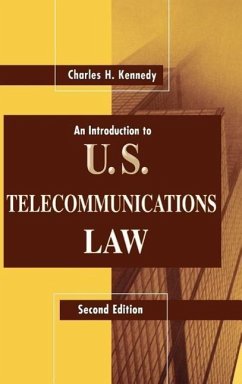This completely revised and updated edition includes a comprehensive look at the Telecommunications Act of 1996, its sweeping reforms, and the short-term increase in TC regulation complexity resulting from its passage. An Introduction to U.S. Telecommunications Law, Second Edition is a concise, jargon-free reference describing how electronic media and telecommunications companies are required to price their services, interconnect with customers and other service providers, and respond to competition.
Table of content:
Introduction. Incumbent Local Exchange Carriers. Forbearance and the Decline of Common Carrier Regulation. How Much May an ILEC Charge for Exchange and Exchange Access Services? How Much May an ILEC Charge for New or Competitive Services? When, and on What Terms, Must an ILEC Interconnect its Facilities with Those of Other Service Providers? The Bell Operating Companies -- Dismantling the AT&T Divestiture Decree, How Bell Operating Companies May Enter Competitive Markets Under the 1996 Telecommunications Act. Competing Local Exchange Carriers. How Do CLECs Become Licensed to Offer Service? Interexchange Carriers -- Slamming and Regulation of Customer Selection of IXCs. Pay Telephones and Operator Service Providers. Commercial Mobile Radio Service and Private Mobile Radio Service Providers. Internet Access and Content Providers. Support for Universal Service. Regulation of Cable Television. Regulation of Satellite Services. Foreign Ownership and FCC Regulation of International Telecommunications. Appendix: The Economic Background of Telecommunications Law.
Table of content:
Introduction. Incumbent Local Exchange Carriers. Forbearance and the Decline of Common Carrier Regulation. How Much May an ILEC Charge for Exchange and Exchange Access Services? How Much May an ILEC Charge for New or Competitive Services? When, and on What Terms, Must an ILEC Interconnect its Facilities with Those of Other Service Providers? The Bell Operating Companies -- Dismantling the AT&T Divestiture Decree, How Bell Operating Companies May Enter Competitive Markets Under the 1996 Telecommunications Act. Competing Local Exchange Carriers. How Do CLECs Become Licensed to Offer Service? Interexchange Carriers -- Slamming and Regulation of Customer Selection of IXCs. Pay Telephones and Operator Service Providers. Commercial Mobile Radio Service and Private Mobile Radio Service Providers. Internet Access and Content Providers. Support for Universal Service. Regulation of Cable Television. Regulation of Satellite Services. Foreign Ownership and FCC Regulation of International Telecommunications. Appendix: The Economic Background of Telecommunications Law.








